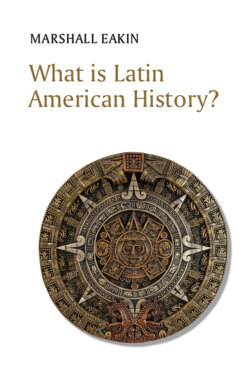What is Latin American History?

Реклама. ООО «ЛитРес», ИНН: 7719571260.
Оглавление
Marshall Eakin. What is Latin American History?
Table of Contents
Guide
Pages
Series Title. What is History? series
What is Latin American History?
Copyright Page
Map
Acknowledgments
Introduction
1 What Is Latin America?
Notes
2 The Pioneering Generations. History and Colonialism
Nineteenth-Century Origins
Professionalization: An Academic Community Emerges (on Three Continents)
On the Eve of the Boom
Notes
3 The Economic and Quantitative Turns. El Boom
The Quantitative “Moment”
Marxisms and Dependency Theories
Notes
4 The Social Turn
Comparative Slavery, Abolition, and Race Relations
Indigenous Peoples
Rural History
Miners, Merchants, and Urban Workers
Women and Gender
Institutions: New Perspectives
Institutionalization of the Field
Notes
5 Cultural and Other Turns. Fin de Siècle
A Cultural Turn?
Latin American History and the Cultural Turn
Gender and Sexuality
Indigenous History
Notes
6 Beyond Latin American History. A New Century, a New Millenium
Borders and Frontiers
Transnational History
A New Economic History?
The Atlantic World Emerges
Race and Ethnicity
A Natural Turn?
Science, Medicine, Public Health, and Technology
Unity and Diversity
Notes
Epilogue: The Future of Latin American History
Notes
Further Reading
Chapter 1 What Is Latin America?
Chapter 2 The Pioneering Generations
Chapter 3 The Economic and Quantitative Turns
Chapter 4 The Social Turn
Chapter 5 Cultural and Other Turns
Chapter 6 Beyond Latin American History
Epilogue: The Future of Latin American History
Selected General Histories of Latin America
Index
POLITY END USER LICENSE AGREEMENT
Отрывок из книги
Marshall C. Eakin
An abraço to Tom Holloway for his advice and suggestions since the inception of the project. I also very much appreciate the generous and helpful comments of the two anonymous outside readers of the manuscript. Many, many years ago, Teresa Meade (without either of us knowing) gave me the initial push in our work on the Conference on Latin American History’s Teaching Committee. Obrigado, Teresa. After a quarter century, here is the result of our discussions. As always, many thanks to my colleagues in the Department of History at Vanderbilt University, especially Jane Landers, Celso Castilho, Eddie Wright-Rios, and Frank Robinson, our Latin American history junta. The graduate students in my Research Seminar in Latin American History during the fall of 2020 read and discussed an earlier version of the manuscript. Thank you, Claudia Monterroza Rivera, André Ramos Chacón, Ricky Sakamoto-Pugh, and Alex Sanchez.
.....
As Latin American studies boomed in the 1960s, new professional organizations began to take shape in Europe and the United States, and they adopted the terminology, reinforcing its linguistic dominance. U.S. scholars founded the Latin American Studies Association (LASA) in 1965 along with its own journal, the Latin American Research Review. Originally an association primarily for academics in the United States, in the last two decades it has become a truly international organization of more than 12,000 members, two-thirds of them residing outside the United States. Similarly, the Society for Latin American Studies was founded in the United Kingdom in 1964 with its own journal, the Bulletin of Latin American Research. The institutional and professional associations, centers, and agencies in the United States, Europe, and Latin America had overwhelmingly adopted the terminology of “Latin America” by the 1970s.
The recent critiques of the term Latin America have roots at least back to the early twentieth century. Intellectuals in regions with indigenous or Afrodescendant majorities in the 1920s and 1930s spoke of Indo America or Afro America. In Mexico and Brazil, the largest countries in the region (and with half the population), intellectuals consciously spurned the Eurocentric visions that had dominated in the nineteenth century and began to emphasize the racially and culturally mixed heritage of Mexicans and Brazilians. They embraced the African and Native American contributions to national culture along with the European (or Latin) heritage. Despite these critiques, the majority of these intellectuals were themselves primarily of European descent, and rarely did they reject the increasingly awkward term Latin America.
.....